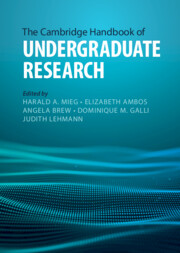Book contents
- The Cambridge Handbook of Undergraduate Research
- The Cambridge Handbook of Undergraduate Research
- Copyright page
- Contents
- Figures
- Tables
- Contributors
- Foreword
- Foreword
- 1 Introduction
- Part I Theory and Research on Undergraduate Research
- Part II Implementation, Approaches, Methods
- Part III Disciplines
- 17 Introduction
- Part III.1 STEM
- 18 Undergraduate Research in Physics
- 19 Undergraduate Research in Chemistry
- 20 Undergraduate Research in Biology
- 21 Undergraduate Research in Mathematics
- 22 Undergraduate Research in Engineering
- 23 Undergraduate Research in Data Science
- Part III.2 Health
- Part III.3 Social Sciences
- Part III.4 Humanities
- Part III.5 Arts & Design
- Part III.6 Disciplines A–Z
- Part IV International Perspective
- Part V Avenues for Developing Undergraduate Research
- Index
- References
20 - Undergraduate Research in Biology
from Part III.1 - STEM
Published online by Cambridge University Press: 11 August 2022
- The Cambridge Handbook of Undergraduate Research
- The Cambridge Handbook of Undergraduate Research
- Copyright page
- Contents
- Figures
- Tables
- Contributors
- Foreword
- Foreword
- 1 Introduction
- Part I Theory and Research on Undergraduate Research
- Part II Implementation, Approaches, Methods
- Part III Disciplines
- 17 Introduction
- Part III.1 STEM
- 18 Undergraduate Research in Physics
- 19 Undergraduate Research in Chemistry
- 20 Undergraduate Research in Biology
- 21 Undergraduate Research in Mathematics
- 22 Undergraduate Research in Engineering
- 23 Undergraduate Research in Data Science
- Part III.2 Health
- Part III.3 Social Sciences
- Part III.4 Humanities
- Part III.5 Arts & Design
- Part III.6 Disciplines A–Z
- Part IV International Perspective
- Part V Avenues for Developing Undergraduate Research
- Index
- References
Summary
Future biologists require a profound understanding of leading biological concepts, mechanisms, methods, experimental design and data analysis on top of subject-specific expertise. Early and continued exposure to undergraduate research (UR) formats offers a central key to train the next generation of biologists, to drive student motivation and to facilitate early career decisions. UR formats can be classified at different pedagogical levels. At the highest level, students conduct their own independent research and create new knowledge. Course-based research experiences (CUREs) are suitable for larger groups and produce outcomes similar to research internships but require increased creativity on the side of faculty, depending on the respective framework and group size. To implement UR represents a challenge for faculty, as roles change from teaching toward mentoring, increasing the workload. Nevertheless, biology offers a wide variety of anchors for UR formats that are most suitable as an active learning element in biology education to balances pedagogical and research goals and increase student motivation.
Keywords
- Type
- Chapter
- Information
- The Cambridge Handbook of Undergraduate Research , pp. 207 - 214Publisher: Cambridge University PressPrint publication year: 2022

